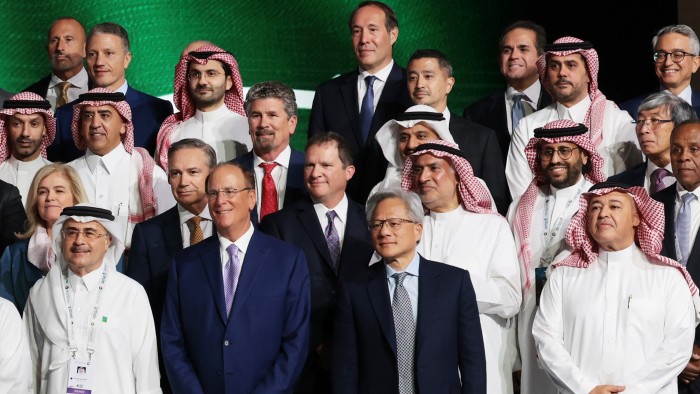Unlock the White House Watch newsletter for free
Your guide to what Trump’s second term means for Washington, business and the world
If there was any doubt that geopolitics has come to play an outsized role in the fortunes of the US artificial intelligence industry, look no further than the recent upturn in the fortunes of leading AI chipmaker Nvidia.
The company’s stock market value has just surged by more than half a trillion dollars in the space of a week on the back of US policy that seemed geared to the needs of the country’s AI companies. At first glance, that might look like a strong “buy” signal for US AI, but the whiplash effect on tech stocks from the erratic opening months of the Trump White House makes such optimism premature.
The chipmaker’s hot streak on Wall Street started with the news that the new administration was about to suspend measures designed to slow the spread of advanced AI around the world. The so-called AI diffusion rule, announced late in the Biden presidency and due to take effect this week, would have restricted the free sale of the most sensitive AI technologies to 18 close US allies.
Most other countries, consigned to “tier two” status, would have had access to only a limited supply of AI chips. Importantly, the blueprints for leading-edge models would also have been barred from export to these countries, keeping the training and operation of the most advanced AI inside a narrow circle of countries. Lifting those restrictions doesn’t just point to potential new markets for US tech, but could give US AI companies a freer hand in deciding the optimal location for their operations, perhaps even leading to an offshoring of advanced AI.
That news was followed at the start of this week with a significant reduction in the severe import tariffs imposed last month on China. A day later, and timed to coincide with a Middle East visit by Trump, Nvidia’s stock got another big lift as the company announced a large deal to sell its most advanced data centre chips to Saudi Arabia.
The lurch of US policy in directions that seem to favour its leading AI companies looks like welcome relief for Silicon Valley. However, far from being settled, major parts of the new administration’s tech policy are now officially up in the air. That leaves them vulnerable to horse-trading among different interest groups in the White House, as well as the president’s own whim.
Areas of uncertainty include what a replacement AI diffusion rule will look like. The new administration may have shown an openness to countries like Saudi Arabia and the UAE, which is also now in line for a large batch of Nvidia chips — but it is still considering what extra restrictions are needed to prevent the re-exporting of sensitive US technology to China.
At the same time, it appears to be working on a comprehensive new tariff regime for semiconductors. And export restrictions on direct sales of AI chips to China continue to be a moving target. A month ago, Nvidia’s market cap slumped by $370bn in just three trading sessions after it disclosed the latest controls on its China sales. That brought a nadir for its stock — before, that is, the more favourable moves in Washington that have since helped to send the price back up nearly 40 per cent.
At least the signal from the Middle East this week has been that the US is very much open to unrestricted AI business with its favoured allies, and its tech companies have shown they are more than ready to surge through any open door presented to them. Countries such as Saudi Arabia may have a long way to go to develop the wider tech skills and capabilities they aspire to, but at least they have plentiful supplies of energy and cash.
The outlook for opening other markets is harder to predict. As the US tries to reach a host of new trade deals, there is a risk that access to its advanced tech will become just one more pawn haggled over in negotiations.
US tech investors, meanwhile, may take extra heart from Washington’s warning to international customers not to buy the latest Ascend data centre chips from Huawei. In practice, there is not much of a sign that is a market yet for these chips outside China. To judge by the pace of recent advances, this probably won’t always be the case. At some point, open Chinese AI models tuned to run on a more advanced generation of Chinese AI chips could come to represent a viable alternative on global markets. The question, at that point, will be whether Washington has already done enough to embed its homegrown AI in all the markets that matter.
